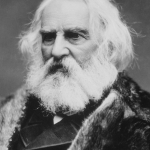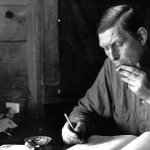Somewhat back from the village street
Stands the old-fashioned country-seat.
Across its antique portico
Tall poplar-trees their shadows throw;
And from its station in the hall
An ancient timepiece says to all, —
"Forever — never!
Never — forever!"
Half-way up the stairs it stands,
And points and beckons with its hands
From its case of massive oak,
Like a monk, who, under his cloak,
Crosses himself, and sighs, alas!
With sorrowful voice to all who pass, —
"Forever — never!
Never — forever!"
By day its voice is low and light;
But in the silent dead of night,
Distinct as a passing footstep's fall,
It echoes along the vacant hall,
Along the ceiling, along the floor,
And seems to say, at each chamber-door, —
"Forever — never!
Never — forever!"
Through days of sorrow and of mirth,
Through every swift vicissitude
Of changeful time, unchanged it has stood,
And as if, like god, it all things saw,
It calmly repeats those words of awe, —
"Forever — never!
Never — forever!"
In that mansion used to be
Free-hearted Hospitality;
His great fires up the chimney roared;
The stranger feasted at his board;
But, like the skeleton at the feast,
That warning timepiece never ceased, —
"Forever — never!
Never — forever!"
There groups of merry children played,
There youths and maidens dreaming strayed;
O precious hours! O golden prime,
And affluence of love and time!
Even as a miser counts his gold,
Those hours the ancient timepiece told, —
"Forever — never!
Never — forever!"
From that chamber, clothed in white,
The bride came forth on her wedding night;
There, in that silent room below,
The dead lay in his shroud of snow;
And in the hush that followed the prayer,
Was heard the old clock on the stair, —
"Forever — never!
Never — forever!"
All are scattered now and fled,
Some are married, some are dead;
And when I ask, with throbs of pain,
"Ah! when shall they all meet again?"
As in the days long since gone by,
The ancient timepiece makes reply, —
"Forever — never!
Never — forever!"
Never here, forever there,
Where all parting, pain, and care,
And death, and time shall disappear, —
Forever there, but never here!
The horologe of Eternity
Sayeth this incessantly, —
"Forever — never!
Never — forever!"





















Comment form: